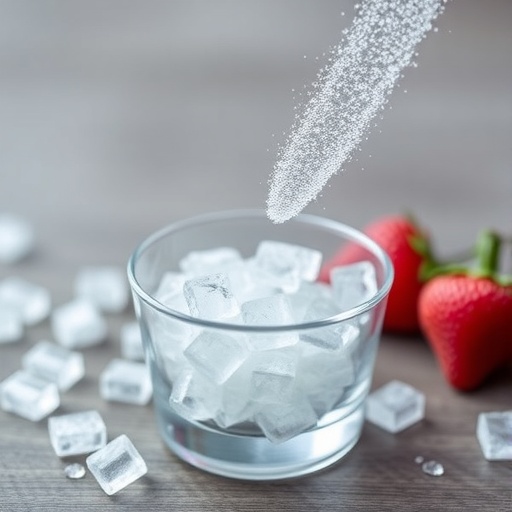In recent years, the complex interplay between diet, the gut microbiome, and cancer therapy has captured the attention of scientists seeking to optimize patient outcomes. New research emerging from the University of Pittsburgh and the UPMC Hillman Cancer Center has uncovered a startling connection between the consumption of sucralose—a widely used artificial sweetener—and diminished responses to cancer immunotherapy. The findings, published in the prestigious journal Cancer Discovery, indicate that sucralose intake may undermine the efficacy of immune checkpoint inhibitors in patients battling melanoma and non-small cell lung cancer.
Immune checkpoint inhibitor therapies, such as anti-PD1 agents, revolutionize cancer treatment by reactivating T cell-mediated immune responses against malignant cells. However, clinical outcomes vary widely, and researchers have long sought to identify extrinsic factors that modulate treatment effectiveness. In this study, investigators meticulously examined patient dietary histories alongside their responses to immunotherapy, revealing an unexpected negative correlation between high sucralose consumption and treatment success. Those with diets rich in this artificial sweetener exhibited poorer survival and reduced therapeutic response compared to their low-sucralose-consuming counterparts.
At the heart of these observations lies the gut microbiome, a densely populated community of microorganisms integral to immune regulation. Utilizing sophisticated mouse models of adenocarcinoma and melanoma, the research team demonstrated that sucralose alters microbial composition, particularly favoring bacteria species that metabolize and degrade arginine, a non-essential amino acid critical for T cell activation. This microbial shift led to systemic depletion of arginine levels in blood, tumor microenvironment fluids, and stool, effectively hampering the immune system’s capacity to mount an effective anti-cancer response.
Arginine serves as a pivotal substrate for T cells, fueling their proliferation, activation, and cytotoxic functions essential for eradicating tumor cells. The depletion induced by sucralose-mediated microbiome disruptions thus compromises T cell function, directly impacting the potency of anti-PD1 immunotherapy. Lead author Abby Overacre, Ph.D., assistant professor in the Department of Immunology at Pitt, emphasizes that this mechanistic insight offers a tangible explanation for clinical observations and opens potential avenues for intervention.
Crucially, the researchers found that this immunosuppressive effect was reversible. Administering arginine or its metabolic precursor citrulline restored T cell functionality and rescued immunotherapy efficacy in sucralose-fed mice. These interventional studies not only confirm the causal role of arginine depletion in treatment resistance but also propose a practical therapeutic strategy. Such nutrient supplementation could become a simple adjunct to improve patient outcomes without necessitating drastic lifestyle or dietary changes during intensive cancer treatment.
The team also explored the relevance of these preclinical findings to human patients. In an analysis of 132 individuals with advanced melanoma or non-small cell lung cancer undergoing anti-PD1 therapy—with or without chemotherapy—dietary questionnaires assessing artificial sweetener consumption revealed consistent trends. High sucralose intake was associated with reduced immunotherapy effectiveness regardless of cancer subtype, disease stage, or therapeutic regimen. This important translational result underscores the potential clinical implications and justifies further prospective trials.
Sucralose’s influence on the gut microbiota is especially significant given the mounting recognition of the microbiome as a key modulator of immune responses in cancer therapy. By shifting bacterial populations toward those that catabolize arginine, sucralose inadvertently creates an environment antagonistic to robust antitumor immunity. Disruptions of this nature exemplify how seemingly benign dietary components can have profound downstream biological effects, particularly in vulnerable patient populations undergoing complex treatments.
Beyond sucralose, the investigators plan to broaden their research scope to evaluate other common sugar substitutes, including aspartame, saccharin, xylitol, and stevia. Each sweetener’s unique chemical structure and metabolism may differentially impact the gut flora and immune landscape, thus influencing immunotherapy outcomes in distinct ways. Unraveling these nuances will be vital for developing dietary guidelines and interventions tailored to optimize cancer treatment efficacy.
This groundbreaking study was the product of a multidisciplinary collaboration among immunologists, oncologists, microbiologists, and biochemists. The senior author, Diwakar Davar, M.D., an associate professor of medicine at Pitt and a medical oncologist at UPMC Hillman, highlights the translational impact of these findings. The research not only elucidates a novel mechanism of treatment resistance but also paves the way for innovative strategies that leverage nutritional modulation of the microbiome to enhance therapeutic responses.
Supported by significant funding from the National Institutes of Health alongside foundations dedicated to cancer research, this work exemplifies the potential of integrative biomedical science to transform clinical practice. Future clinical trials underway aim to investigate citrulline supplementation as a means to elevate systemic arginine and counteract the microbiome alterations induced by sucralose. Such trials may herald a new paradigm in precision nutrition to augment immune-based cancer therapies.
Ultimately, this research adds an important chapter to the evolving narrative of how diet and the microbiome intersect with oncologic treatment. While patients undergoing immunotherapy face many challenges, the possibility of mitigating dietary sweetener-induced immunosuppression via safe and accessible supplements offers hope. Clinicians and patients alike may soon have evidence-based guidance to navigate these complex interactions, striving for improved survival and quality of life in the fight against cancer.
Subject of Research: People
Article Title: Sucralose consumption ablates cancer immunotherapy response through microbiome disruption
News Publication Date: 31-Jul-2025
Web References: https://aacrjournals.org/cancerdiscovery/article/doi/10.1158/2159-8290.CD-25-0247
References: 10.1158/2159-8290.CD-25-0247
Image Credits: Hot Metal Studio
Keywords: Health and medicine, Cancer, Cancer immunology, Cancer immunotherapy, Checkpoint therapy, Microbiota, Gut microbiota, T lymphocytes, Arginine, T cell responses




